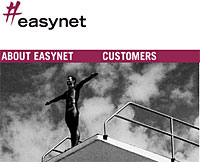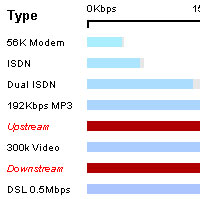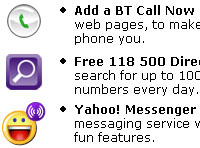 BT has today set-up a new division, known as OpenReach. They’ve been under pressure from some time from competitors and regulators to curb their monopolistic tendencies (they still own over 85% if the infrastructure in the UK). There has even been talk of splitting BT up – although OfCom has currently reject this.
BT has today set-up a new division, known as OpenReach. They’ve been under pressure from some time from competitors and regulators to curb their monopolistic tendencies (they still own over 85% if the infrastructure in the UK). There has even been talk of splitting BT up – although OfCom has currently reject this.
BT’s response is OpenReach. A division that runs the copper in the ground, which will give equal access to BT Wholesale (who can sell it on with services to BT Retail and others) and non-BT operators in the local loop unbundling (LLU) game (such as Bulldog, Easynet etc). OpenReach (Don’t you find that Open seems to be BT’s buzzword – OpenWorld was first, perhaps BT Open will be next, then all their divisions will convert with the word Open tacked to it) will still be a division of BT Group (maybe now OpenGroup?) but will be run by the EAB (Equal Access Board) which is made up of both BT, and more importantly, non-BT people.
Smoke and mirrors
Though this is a look like a commendable approach, it may also be a huge gambit that BT are playing in order to keep everyone’s eye off their real game.
Ofcom (the Super Regulator) are under tremendous pressure to maintain a level telecoms playing field, this is added to by the UK government putting further pressure on them, as broadband is seen to be a key economic marker. This has made Ofcom wield a double-edged sword – forcing BT to maintain wholesale pricing on their ADSL services (i.e. not lower them), until there at least 1.5m unbundled lines in the UK.
At first glance this sounds like a good idea, as it gives the LLU operators a chance to launch their services without BT suddenly reacting and putting everyone out of business by massive wholesale price cuts. However, the other side of this is that there are 5m+ BT Wholesale customers (via broadband ISPs) out there now who won’t see massive price cuts.
What’s good for LLU is probably not so good (at least in the short term) for the majority of broadband users in the UK – and by implication the population of the UK.
OpenReach doesn’t help those users either, in fact it just adds another level of confusion.
Distraction
BT’s competition now have to worry about what OpenReach are up to, and gives the opportunity for another several years of arguments and Ofcom intervention. While everyone’s arguing with each other (sadly not BT), they are taking their eye off BT’s long term plans. This is a big mistake, and if they don’t correct this, they won’t be in business in the future.
BT to a degree want this, they have teams of regulatory lawyers who, after long period of discussion, can agree to certain things and make life look lovely in one sentence, while tying things in red-tape in another. It’s well worth noting that BT have a bigger regulatory department than Ofcom have staff.
What’s to be done with LLU in the UK?
LLU operators are slowly gaining a foothold and launching innovative services, leaving BT to catch-up. Unfortunately there are less than 100,000 unbundled lines compared to BT’s 5m+ DSL customers and their 25m connected premises.
To make LLU economic, the operators are picking exchanges that have a high population density and the ‘right’ demographic – leading to all the operators tending to pick the same exchanges. There are 5,600 digital local exchanges (DLEs) in the UK, even an operator with a LOT of money is likely to target less than 1,000 of them, most seem to be averaging around 400.
The real boost to LLU that’s needed is co-operation. If all the non-BT operators pooled their resources and built a operator-neutral broadband network that any of them could run services over, they would end up with a network that would start to compete with BT’s. Telecoms operators and ISPs need to realise the real competition isn’t each other, but BT.
21CN, BT’s OpenReach killer?
In the medium term BT are rolling out their 21CN (21st Century Network) which links all of BT’s DLEs using IP. All phone calls become VoIP (voice over IP) and every home has a high speed broadband IP connection.
BT will also launch a range of services to go with their new IP only offering such as IPTV (Internet TV).
By 2009 BT expect to turn off the existing PSTN (public switched telephone network) and all of the UK will be running on the IP 21CN.
This will be great for consumers, potentially 24Mb/s broadband into every home, plug in a VoIP phone and it will just work, High Definition (HD) TV into every bedroom. The downside is it has the potential to put all of BT’s competition out of business in one fell swoop.
BT deregulated with VoIP
BT have been very clever. They’ve supported Ofcom in their views of not heavily regulating VoIP, allowing “new wave” VoIP providers to flourish without being burdened in regulatory red-tape.
Seems strange doesn’t it? Until you realise that when BT’s 21CN rolls-out, it will ALL be VoIP. Suddenly BT are free to do things with it that under the current telecoms environment they might face regulatory scrutiny.
Ofcom are then in a difficult position as they can’t make one rule for BT and another for everyone else. Their choice? They leave VoIP lightly regulated, or make it very regulated and make it difficult for all those new players.
BT OpenReach is a good start, is it too little too late?
 BT will roll out IPTV in ‘late summer 2006’, according to Andrew Burke, CEO, BT Entertainment, (pictured right) speaking at the Enhanced TV Show in London today.
BT will roll out IPTV in ‘late summer 2006’, according to Andrew Burke, CEO, BT Entertainment, (pictured right) speaking at the Enhanced TV Show in London today. Elena Branet, Senior Marketing Manager at Microsoft TV, (pictured left) said IPTV would allow viewers to use picture in picture channel surfing, see caller ID on their TV sets, or watch TV while messaging a virtual community of friends and family. She said that basic IPTV would be possible with a minimum connection speed of just 1.5 MB.
Elena Branet, Senior Marketing Manager at Microsoft TV, (pictured left) said IPTV would allow viewers to use picture in picture channel surfing, see caller ID on their TV sets, or watch TV while messaging a virtual community of friends and family. She said that basic IPTV would be possible with a minimum connection speed of just 1.5 MB. Also at the show, David Bainbridge, MD of Yes, Yoo Media, (pictured right) said trials of a new product, ‘Broadband TV’ would start on ntl in October. Not to be confused with IPTV, this is a solution to help content creators repurpose content across platforms – working with cable TV, IPTV and 3.
Also at the show, David Bainbridge, MD of Yes, Yoo Media, (pictured right) said trials of a new product, ‘Broadband TV’ would start on ntl in October. Not to be confused with IPTV, this is a solution to help content creators repurpose content across platforms – working with cable TV, IPTV and 3. BT has today set-up a new division, known as OpenReach. They’ve been under pressure from some time from competitors and regulators to curb their monopolistic tendencies (they still own over 85% if the infrastructure in the UK). There has even been talk of splitting BT up – although OfCom has currently reject this.
BT has today set-up a new division, known as OpenReach. They’ve been under pressure from some time from competitors and regulators to curb their monopolistic tendencies (they still own over 85% if the infrastructure in the UK). There has even been talk of splitting BT up – although OfCom has currently reject this. UK Online have officially joined the 24Mbps broadband party by announcing the October launch of their own broadband ADSL2+ based product.
UK Online have officially joined the 24Mbps broadband party by announcing the October launch of their own broadband ADSL2+ based product. UK Online has been conducting technical trials of its ADSL2+ service since March of this year and their 24Mb broadband service should be available in October for under £30 (~$55 ~€43) a month.
UK Online has been conducting technical trials of its ADSL2+ service since March of this year and their 24Mb broadband service should be available in October for under £30 (~$55 ~€43) a month. Be Unlimited
Be Unlimited Temptingly, there’s no connection fee for new users with a free Wi-Fi-enabled modem lobbed in for no charge (the company will be using DSLAMs from Alcatel, and a Thompson 716g V5 wireless modem, optimised for VoIP and video-streaming applications.)
Temptingly, there’s no connection fee for new users with a free Wi-Fi-enabled modem lobbed in for no charge (the company will be using DSLAMs from Alcatel, and a Thompson 716g V5 wireless modem, optimised for VoIP and video-streaming applications.) Like Popeye with a mouthful of spinach, broadband providers Easynet have barged BT out of the way to claim a lucrative three-year deal to supply wholesale broadband services to Onetel, Centrica’s telecommunications division.
Like Popeye with a mouthful of spinach, broadband providers Easynet have barged BT out of the way to claim a lucrative three-year deal to supply wholesale broadband services to Onetel, Centrica’s telecommunications division.  Ian El-Mokadem, Managing Director, Onetel sounded chuffed with the deal: “The partnership with Easynet will allow us to deploy next generation broadband services and benefit from Local Loop Unbundling economics. The market is set to evolve rapidly and we wanted a partner that could demonstrate experience in the local loop, and a willingness to work in a true partnership.
Ian El-Mokadem, Managing Director, Onetel sounded chuffed with the deal: “The partnership with Easynet will allow us to deploy next generation broadband services and benefit from Local Loop Unbundling economics. The market is set to evolve rapidly and we wanted a partner that could demonstrate experience in the local loop, and a willingness to work in a true partnership.  Armchair football fans around Europe will soon be able to enjoy live Champion’s League matches over the Internet and mobile phones.
Armchair football fans around Europe will soon be able to enjoy live Champion’s League matches over the Internet and mobile phones.  Champions League coverage in the UK is provided by BSkyB and ITV (both of whom look likely to retain their current rights), and the Internet simulcasts could provide a honey pot for new revenue streams with advertising and betting partners.
Champions League coverage in the UK is provided by BSkyB and ITV (both of whom look likely to retain their current rights), and the Internet simulcasts could provide a honey pot for new revenue streams with advertising and betting partners.  BSkyB has already announced its commitment to
BSkyB has already announced its commitment to  BT has announced that it will be doubling the speed of its entry-level broadband service.
BT has announced that it will be doubling the speed of its entry-level broadband service.  BT’s generosity knows some bounds though, with its no frills package retaining its monthly usage limit at 1 gig.
BT’s generosity knows some bounds though, with its no frills package retaining its monthly usage limit at 1 gig.  This is the second free upgrade that BT has introduced, with the telecoms giant upping the speed for all of its retail broadband customers back in February.
This is the second free upgrade that BT has introduced, with the telecoms giant upping the speed for all of its retail broadband customers back in February.  I quickly learnt that not only was I paying more than most, but my BT connection was as swift as a sleepy sloth on a hot day compared to the rocket-like speeds quoted by others.
I quickly learnt that not only was I paying more than most, but my BT connection was as swift as a sleepy sloth on a hot day compared to the rocket-like speeds quoted by others.  We had a report from a reader today that he’d been … ehm, carrying out tests on his content filtering service. This entailed going to sites with photos of naked bodies – purely to test that the content filter blocked his access to them you understand. One of first sites he went to was the well known UK tabloid, The Sun.
We had a report from a reader today that he’d been … ehm, carrying out tests on his content filtering service. This entailed going to sites with photos of naked bodies – purely to test that the content filter blocked his access to them you understand. One of first sites he went to was the well known UK tabloid, The Sun.  The piece in the Gizmo section of the site and paper features BT’s new model to promote BT Communicator, Michelle Marsh.
The piece in the Gizmo section of the site and paper features BT’s new model to promote BT Communicator, Michelle Marsh.  Their glorious football team many not be first at anything much these days, but BT have announced that Cardiff and the surrounding area will lead the UK with the implementation of their 21st Century Network (21CN).
Their glorious football team many not be first at anything much these days, but BT have announced that Cardiff and the surrounding area will lead the UK with the implementation of their 21st Century Network (21CN).  BT is expected to begin migrating around 350,000 customer lines in the area during the second half of 2006, with the 21CN programme requiring the replacement of equipment in more than 50 local exchanges along with the implementation of new IT systems to make the technology do its stuff.
BT is expected to begin migrating around 350,000 customer lines in the area during the second half of 2006, with the 21CN programme requiring the replacement of equipment in more than 50 local exchanges along with the implementation of new IT systems to make the technology do its stuff. 
 Delivering a king size slipper to the ample bottom of BT, the Advertising Standards Authority (ASA) has ruled that BT’s PC-based internet telephony service, BT Communicator, does not make “free” calls.
Delivering a king size slipper to the ample bottom of BT, the Advertising Standards Authority (ASA) has ruled that BT’s PC-based internet telephony service, BT Communicator, does not make “free” calls.  The Kentish complainant pointed out that by using the VoIP service he’d rapidly burn up the 1 gig a month usage limit that BT slaps on its Broadband Basic packages – and once he exceeded that limit, he’d have to start forking out for additional time online.
The Kentish complainant pointed out that by using the VoIP service he’d rapidly burn up the 1 gig a month usage limit that BT slaps on its Broadband Basic packages – and once he exceeded that limit, he’d have to start forking out for additional time online.  Smarting from a derriere rouge par excellence, BT was told “not to describe calls that depleted a consumer’s usage allowance as ‘free’ and to state prominently in advertisements for BT Communicator that making telephone calls depleted a consumer’s broadband usage allowance”.
Smarting from a derriere rouge par excellence, BT was told “not to describe calls that depleted a consumer’s usage allowance as ‘free’ and to state prominently in advertisements for BT Communicator that making telephone calls depleted a consumer’s broadband usage allowance”.